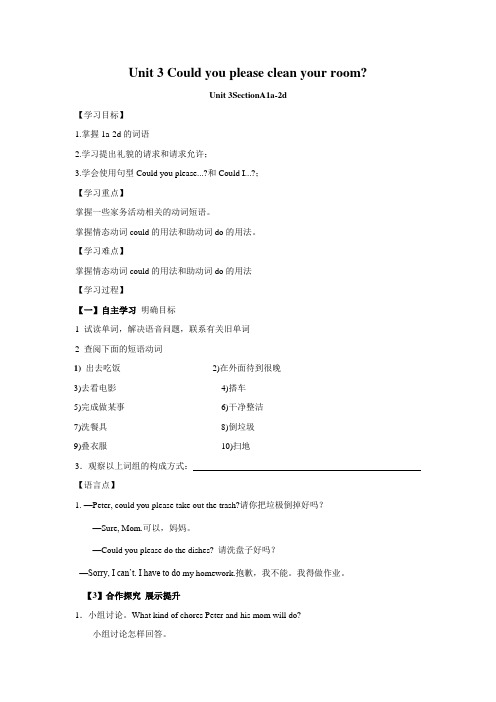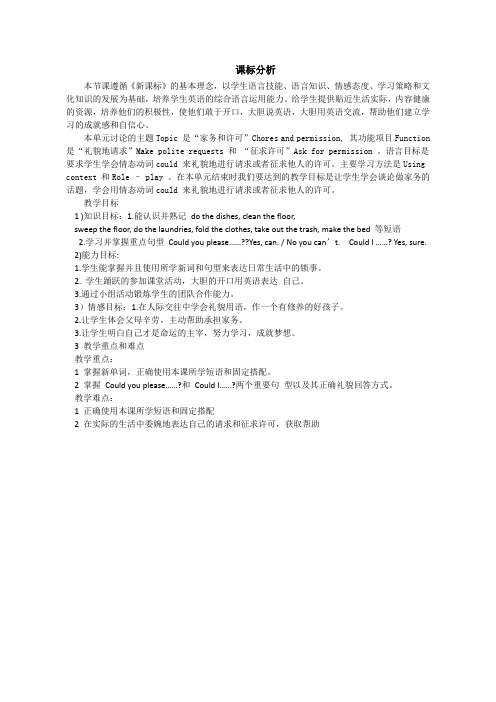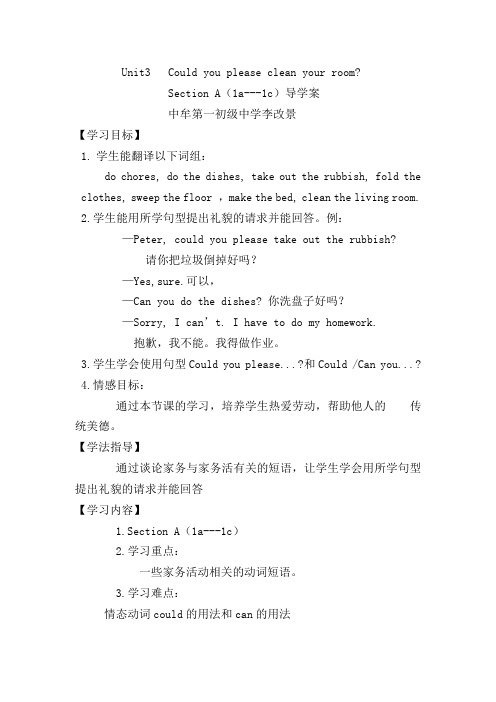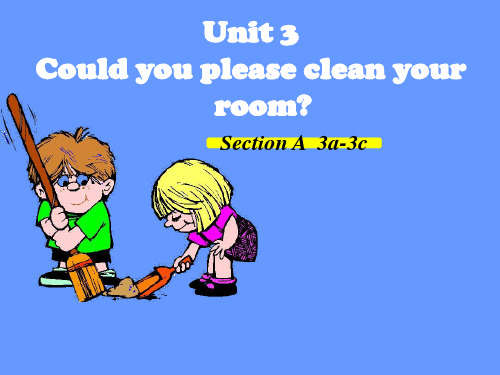人教版八年级英语下册Unit 3 Could you please clean your room_ 单元测试题
初中英语人教版八年级下册Unit 3 could you please clean

Unit 3 Could you please clean your room?Period 1 (Section A 1a—1c)Ⅰ. Teaching aimsⅰ.Learn the new expressions for different chores, like do the dishes, sweep the floor, take out the rubbish and so on. ⅱ.Learn to make polite requests using “Could you please…?”ⅲ.Encourage students to help their parents do chores.Ⅱ. Important and difficult keysImportant keysⅰ.Learn key words and expressions.ⅱ.Learn to make polite requests using “Could you please…?”Difficult keyHow to answer the question “ Could you please…?”Ⅲ. Teaching proceduresStep ⅰ Lead-in(ⅰ) Greet the students as usual(ⅱ) Ask students the meaning of “family”, it means ,“Father and mother ,I love you.”Next ,show students two questions, “Do you love your parents?”“Do you do chores at home?”Tell them do chores means do housework(做家务).They can answer the questions together.(ⅲ) Then , play a flash for students, ask them what it istalking about.Step ⅱ Presentation(ⅰ) New words and phrases.Show some pictures on the whiteboard, ask students to say what they are doing in Chinese, and then teach them the new phrases. Such as, do the dishes, take out the rubbish and so on, and read after me. At the same time, let them pay attention to some keys.(ⅱ) ChallengeShow the students some phrases in Chinese, ask some students to say out their English expressions, which can check teaching and learning.Step ⅲPractice(ⅰ) Look and sayThis activity aims to review the new phrases.There are some cards on the teacher’s desk. And at the corner of the classroom, there are some cleaning tools, too.First, tell students what to do in this activity and how to do it.Then, invite some students to perform in pairs. A student acts the other finds out the phrase. Next, put up the cards on the blackboard one by one. At the same time, add a new phrase,mop the floor(拖地).Also, ask a student to take out the rubbish, I can give her three sentences,“Take out the rubbish.”“Please take out the rubbish.”“Could you please take out the rubbish?”According to her responses, let students choose a more polite sentence. Finally, introduce the structure “Could you please…?” Tell them when we want to make polite requests, we can use the structure “Could you please…?”and we can make conversations like this ,A: Could you please...?B: Yes, sure. / All right. /No problem. / Certainly.So rry, I can’t. I have to do...Sorry, I can’t. I am doing...Show students conversations, let them know how to response.(ⅱ) Invite some students to answer questions using “Yes./ Sure. / All right. ”“ Sorry, I have to…”and so on. StepⅳListeningActivity 1bRead the instruction. Point to the chart, show students the columns with the heading Peter’s mother and Peter.Tell students that they will hear a conversation between Peter and his mother. They have to listen to the recordingcarefully and check the chores Peter’s mother or Peter does.Play the recording the first time. Students only listen.Then play a flash, ask students to check their answers.Later correct the answers.Step ⅴ Pair workActivity 1cTell students today is their house Clean-up Day. Make conversations between them and their parents using the new phrases and structures.Give them several minutes to do it. Then invite some pairs to act it out for the class.StepⅵConsolidationDo some exercises for consolidation.StepⅶSummaryIn this period, we’ve learned how to make polite requests. Through some listening and speaking practice, we consolidated The target language and we know we should love our parents and help them with housework at home.Step ⅷHomework(ⅰ) Remember the new phrases.(ⅱ) Learn to how to use the new structure.。
英语人教版八年级下册Unit3 Could you please clean .doc 林

Unit3 Could you please clean your room ?第1课时Section A(1a-2b)预习导学:Ⅰ基础单词1.垃圾;废弃物2. 扫;打扫3.地板4. foldⅡ、核心短语、句子1. 倒垃圾2.扫地3.洗碗4.您能帮我倒垃圾吗? __________________________5. 请你扫地好吗? __________________________6. 你能洗碗吗?__________________________Ⅲ.重要句型1.-- you please the ?请你扫一下地板,行吗?--Yes, sure.可以。
2.—Could I answer the question in Chinese?(做出肯定回答)--Yes, .3.—Could you please help me with English tonight?(做出否定回答)--- ,I .I’m leaving for Shanghai by train tonight.随堂测试:Ⅰ.单项选择:( )1.---Could you please turn off the light? ---__________.A. Yes, I could B .No, I couldn’t. C. Yes, sure( )2.Could you please _______your bed?It’ mess.A .make B. making C. to make( )3.---Does he _____take out the rubbish now?---Yes, he does .A. mustB. has toC. have to( )4.---Mum, Could I finish________ the football match?---No, you have to do your homework first.A .watch B. to watch C. watching( )5.There are some books in the box. Could you please_________?A .take it out B. take them out C. take out themⅡ.用括号内所给词的适当形式填空。
新人教八年级英语下册第三单元知识点

Unit3Couldyoupleasecleanyourroom?一.情could的用法1.提出礼貌的要求Couldyouplease(not)dosth? 你〔做〕......好?用于提出求,希望得到方的肯定答复,的气比客气委婉。
Could不是can的去式,是委婉、礼貌的法。
答复用can.肯定答复:Yes,sure./Yes,Ican./Ofcourse,Ican./Certainly./Noproblem./Withpleasure.否认答复:Sorry,Ican ’t/ImafraidIcan’t.Ihaveto⋯,I’mgoingto⋯(明理由)2.表示求可CouldIdoasth? 我可以做......?肯定答复:Yes,youcan./Yes,please/Ofcourse /Certainly./Noproblem.否认答复:Sorry,you can’t/I’mafraidyoucan’t.can的去式,表示去的能力。
=was/wereabletoSectionA1.takeouttherubbish 把垃圾出去2.dothedishes=washthedishes 洗碗碟3.foldyourclothes 折衣服4.sweepthefloor 地5.makeyourbed 整理床6.cleanthelivingroom 打起居室7.dosomewashing/shopping/cleaning 洗衣服/物/做清8.gooutfordinner 出去吃晚9.gotothemovies去看影10.stayoutlate/untilnine 呆到很晚/呆到9点11.getaride撘12.givesbaridetotown 开送sb到上needtodosomething需要做⋯⋯havetodosomething不得不做⋯⋯15.helpoutwithafewthings帮助做些事情16.atleast至少,多指数量或程度上的最低限度。
初中英语人教版八年级下册Unit3 Could you please clean y

Unit3 Could you please clean your room?Section B 1 (2a-2c)教学目标:知识技能目标:掌握并灵活运用本课的重点词汇depend .develop. since .neighbor. ill. Drop. (认读词汇independence fairness)重点短语:take care of. in order to. depend on读懂“做家务活动”话题的议论类文章,练习使用“略读策略”能力目标:能够运用所学的知识对某件事情提出自己的看法。
情感态度目标:学会在生活中照顾自己,培养自己的独立意识,懂得有礼貌的提出请求,能尊重家长的建议。
教学重点:1、重点词汇:depend .develop. since .neighbor. ill. Drop. (认读词汇independence fairness)2、重点短语:take care of. in order to. depend on3、重点句型:Doing chores helps to develop children ’s independence.Doing chores helps children understand the idea of fairnessThe earlier kids learn to be independent, the better it is for their future.Housework is a waste of children’s time.They have enough stress from school.They should spend their time on schoolwork in order to get good grades and getinto a good university.It is the parents’ job to provide a clean and comfortable environment at home fortheir children.教学难点:新单词和短语的掌握及句子的理解。
Unit3重点知识讲解与训练人教版八年级英语下册

Unit3 could you please clean your room?本单元语法用could 提出请求和征求许可1.用could 提出请求:常见的结构是“Could you(please)do sth?”,意为“(请)你做某事,好吗?”,是一种比较客气、有礼貌地提出请求的方式。
如果同意对方的请求,可以用“OK.”或“No problem.”等来回答:如果不同意对方的请求,可以用“Sorry,I can't.”等来回答,并以委婉的方式来解释原因。
—Could you please open the door?请你把门打开,好吗?—Sure.当然可以。
Could you please sweep the floor?请你扫一下地,好吗?---Could you take the dog for a walk?请你遛一下狗,好吗?---Sorry, I can’t. I have too much homework to do.很抱歉,我不能。
我还有很多的家庭作业要做。
2.用could征求许可:常见的结构是“Could I do sth?”,意为“我能/可以做某事吗?”。
它的肯定回答和否定回答都不用could,习惯上肯定回答用may, can等,而否定回答用can't 或mustn't(语气重),有时也可避而不用。
—Could I smoke here?我可以在这里吸烟吗?—No, you can't, Look at the sign “No Smoking”!不,你不能。
看那个“禁止吸烟”的牌子!配套练习1.—Mom, could I surf the Internet after finishing my homework?—_______. You’d better go out for a walk.A. Go ahead(开始做)B. Sorry, you can'tC. Of course you can2.—Mom. Could I finish_______ the football match?—No, you have to do your homework first.A. watchB. to watchC. watchingD. to watching3.—Helen, could you please water the flowers in my garden?—_______ . They are so lovely.A. That's too badB. With pleasureC. You're welcomeD. I'm afraid not课文重点知识讲解1.掌握下列短语do the dishes洗餐具sweep the floor扫地take out the rubbish倒垃圾make the bed整理床铺fold the clothes叠衣服clean the living room打扫卧室用Could you please do sth?请你做某事,好吗?造句练习请你洗餐具,好吗?___________________________________________________________?请你倒一下垃圾,好吗?_________________________________________________________?请你整理一下床铺,好吗?_______________________________________________________?请你洗洗餐具,好吗?___________________________________________________________?请你把衣服叠一下,好吗?______________________________________________________?请你打扫一下卧室,好吗?______________________________________________________?out for dinner出去吃饭我可以出去吃饭吗?(could I……)________________________________________________ go to the movies去看电影今天晚上我可以和戴尔去看电影吗?______________________________________________ stay out late待在外面很晚妈妈不让我带在外面很晚。
英语人教版八年级下册Unit-3-Could-you-please-clean-

Unit 3 Could you please clean your room?Unit 3SectionA1a-2d【学习目标】1.掌握1a-2d的词语2.学习提出礼貌的请求和请求允许;3.学会使用句型Could you please...?和Could I...?;【学习重点】掌握一些家务活动相关的动词短语。
掌握情态动词could的用法和助动词do的用法。
【学习难点】掌握情态动词could的用法和助动词do的用法【学习过程】【一】自主学习明确目标1 试读单词,解决语音问题,联系有关旧单词2 查阅下面的短语动词1) 出去吃饭_______________ 2)在外面待到很晚_______________3)去看电影_______________ 4)搭车_______________5)完成做某事_______________ 6)干净整洁_______________7)洗餐具_______________ 8)倒垃圾_______________9)叠衣服_______________ 10)扫地_______________3.观察以上词组的构成方式:【语言点】1. —Peter, could you please take out the trash?请你把垃极倒掉好吗?—Sure, Mom.可以,妈妈。
—Could you please do the dishes? 请洗盘子好吗?—Sorry, I can’t. I have to do my homework.抱歉,我不能。
我得做作业。
【3】合作探究展示提升1.小组讨论。
What kind of chores Peter and his mom will do?小组讨论怎样回答。
2.小组活动编对话3.听力:先阅读2a题中Peter的父亲拒绝的理由。
然后听2a, 2b。
完成练习并核对答案。
4.小组合作做2c。
5.分角色表演2d, 小组讨论解决疑难问题。
2019-2020年人教版英语八年级下册Unit3Couldyoupleaseclean

2019-2020 学年人教版英语八年级下册Unit 3 Could you please clean your room?Section A (2a-2d) 导教案【学习目标】1.知识目标:持续讨论做家务的词汇,及如何有礼貌的提出要求。
2.能力目标:1).能听懂和讨论做家务的话题。
2).提升听闻能力和使用目口号言的能力。
3.感情目标:经过学习,要热爱劳动 ,而且主动为父亲母亲分担家务。
【要点、难点】能娴熟运用 Could you please...?和 Could I ... ?来委宛地提出恳求或征采他人的允许及如何有礼貌地拒绝他人并表达自己的原因。
【导学指导】一. Duty Report二. Task1 (任务一 ) 复习对于家务的短语和句型1.幻灯片展现,说出对于家务的短语。
2.齐读短语,男女读,分组读。
3.Pair work 运用 Could you please...?来委宛地提出恳求并回答,假如拒绝,给出合理的原因。
三. Task2 目口号言学习1.读目口号言 1). 齐读 2). 男女读 3). 分组读A: Could I use computer?B: Sorry. I’m go to work on it?A: Well , could I watch TV? B: Yes, you can, but first you have to do homework.2.Pairwork 找几组学生依据语境及图片信息进行示范对话练习。
3.总结议论:小组议论如何征采他人的允许及如何有礼貌地拒绝他人。
四. Task3 听力 2a、2b1.听力前 : 察看 2a 主题图,辨他人物关系及对话地址。
回答:What does Peter want to do?2. 听力中 : 1). Listen carefully. 2).Follow. 3).Listen and repeat.3.听力后 : Pair work 依据 2a 表格运用目口号言表演对话。
初中英语人教版八年级下册Unit 3 Could you please clean

课标分析本节课遵循《新课标》的基本理念,以学生语言技能、语言知识、情感态度、学习策略和文化知识的发展为基础,培养学生英语的综合语言运用能力。
给学生提供贴近生活实际,内容健康的资源,培养他们的积极性,使他们敢于开口,大胆说英语,大胆用英语交流,帮助他们建立学习的成就感和自信心。
本单元讨论的主题Topic 是“家务和许可”Chores and permission, 其功能项目Function 是“礼貌地请求”Make polite requests 和“征求许可”Ask for permission 。
语言目标是要求学生学会情态动词could 来礼貌地进行请求或者征求他人的许可。
主要学习方法是Using context 和Role – play 。
在本单元结束时我们要达到的教学目标是让学生学会谈论做家务的话题,学会用情态动词could 来礼貌地进行请求或者征求他人的许可。
教学目标1 )知识目标:1.能认识并熟记do the dishes, clean the floor,sweep the floor, do the laundries, fold the clothes, take out the trash, make the bed 等短语2.学习并掌握重点句型Could you please……??Yes, can. / No you can’t. Could I ……? Yes, sure.2)能力目标:1.学生能掌握并且使用所学新词和句型来表达日常生活中的锁事。
2. 学生踊跃的参加课堂活动,大胆的开口用英语表达自己。
3.通过小组活动锻炼学生的团队合作能力。
3)情感目标:1.在人际交往中学会礼貌用语,作一个有修养的好孩子。
2.让学生体会父母辛劳,主动帮助承担家务。
3.让学生明白自己才是命运的主宰,努力学习,成就梦想。
3 教学重点和难点教学重点:1 掌握新单词,正确使用本课所学短语和固定搭配。
英语人教版八年级下册Unit3 Could you please clean

1. d 2. a 3. c 4. e 5. b
2. 4b
Fill in the blanks.
3. Make a list of things your group need to do for a camping trip. Then discuss who will do them and complete the chart.
3.学会使用以下句型:
1) Why wasNancy’s mom angry withNancy?
2) You watch TV all the time and never help out around the house.
3) I can’t work all day and do housework all evening.
(4) I’m just as tired as you.
(5) My mom did not say anything and walked away.
(6) Neither of us did any house work for a week.
(7) Could I borrow that book?
1)学习并掌握新词汇:
throw; all the time; neither; shirt; pass; borrow; lend; finger; hate; while
2)能正确使用以下常用表达:
throw down; come over; all the tome; help out; shout back; in surprise; neither of us; as soon as; pass sb. sth.=pass sth. to sb.; borrow sth. from sb.; lend sb. sth.; hate to do sth.
英语人教版八年级下册Unit3-could-you-please-clean-y

Unit1.Could you please clean your room?说课稿一.教学目标:知识目标:引领学生复习并掌握本单元A部分重点词汇,学会并掌握以could委婉地表示请求与许可的句型。
能力目标:使学生学习礼貌地提出请求,学习礼貌地请求允许做某事。
情感目标:通过合作学习(pair-work, group-work),培养学生团结与合作的意识,通过学习,培养学生体谅父母、热爱劳动、勤于分担家务的良好习惯。
二.教学重点、难点:重点:复习掌握和家务有关的词汇;复习并掌握以could委婉,有礼貌地表示请求与许可的句型;通过辩论,为写作积累句型。
难点:综合的运用单元的目标语针对实际情景进行对话;学生独立完成此次的“另类”辩论会。
三.教法和学法1.教法:充分利用教学图片,幻灯片,表演等来开展教学;问答,小组活动式口语交际练习进行各项活动。
2、学法:小组学习法---每6-8人一组小组交流;两两交流。
同时注意保证每个学生都有机会参与学习,培养学生与伙伴合作的意识和策略,提高人际交往能力。
练习法---把大多课堂时间留给学生,使学生在多信息、高密度、快节奏的灵活操练中拓宽学习渠道。
四、教学程序Stage 1Step 1 GreetingsT: Good afternoon, everyone!S: Good afternoon, teacher!Step 2 Lead-inT: How was your holiday?S: It was great/ fantastic/terrible.T: What did you do ?S: I watched TV/played computer games/played basketball.T: When you want to do these things, you should ask your parents for permission, right? So what would you say?S: Could I…?Stage 2 ReviewStep 1 How to ask for permission politely?T: Now, please look at the PPT, and make conversations.Pair work:For example: Could I watch TV?Yes, you can. / Sorry, you can’t.1 .phrases:buy some snacks and drinks; watch TV;go to the movies; play computer games;invite my friends to the party;go to JinFang supermarket( read aloud together and then make conversations)2. Pair work:T: I will give you three minutes to make conversations with your partner.Step 2 Could you please…?T: Did you do any chores at home?Ss: Yes, I did. / No, I didn’t.T: Some students say “ Yes”, others say” No”. OK, please look at the PPT, do you know these chores?Ss: Yes.T: OK, great! Let’s review.T: What’s he doing? What are they doing?Ss: He is doing the dishes. They are sweeping the floor.T: How about this one?Ss: fold the clothes; clean the living room; make the bed;take out the rubbish;T: Very good job! Let’s review some phrases about chores.do the dishes; fold the clothes; make your bed; sweep the floor;clean the living room; take out the rubbish;T: when we ask someone to do these chores, what would we say? Ss: Could you please…?T: Excellent job! (ask one student to make conversation with the teacher)T: There is some rubbish on the floor. Could you please sweep the floor after class?Ss: Of course!T: Let’s go on. How to say and how to response? (show two conversations)Pair work: make conversations.Stage 3 Debate ( group work)Step 1 lead-inT: we talked about so many chores just now, right? Then, do you think we teenagers should do housework at home? Let’s have a debate!Step 2 State opinionT: You have 3 minutes to discuss in your group and someone in your group should state your group’s opinion.Step 3 Free talkT: You have 10 minutes to speak out arguments to support your opinion as many as possible.Step 4 Final statementT: Summarize your ideas.Step 5 Teacher summaryThe main task for students is study, but study is not everything. Just getting good grades is not enough. That’s to say, for us , doing housework is important .Stage 4 HomeworkWriting : Doing housework is important.3.学以致用:Finish the exercises to practice using them.(这一环节的设置,是为了引导学生正确运用以上词汇与短语,特别是注意时态的正确运用)4.句型攻关:Review and show the important drills in SectionA.Then do exercises to practice them.(这一环节,教师与学生共同回顾本部分重点句型并通过练习巩固句型,学会运用)5.口语交际:Students look at the picture and make conversations in pairs.(本环节通过创设具体的情境,让学生在语境中练习使用所复习的句型,真正达到学以致用的目的)6.考点链接:Discuss and review the use of neither, tell the differences between borrow and lend.(本部分是一个拓展提升的环节,所涉及到的两个知识点都是考试中经常遇到的,也是学生经常出错的地方,很有必要重点强调)7.中考真题体验(这一环节让学生真正体验本部分知识在中考中的考试形式及考点应用)Step4. Summary(学生回顾本节课的收获,养成及时总结的习惯)Step5. Test.(此环节目的在于检测学生在这节课的复习效果,以便进一步查漏补缺)Step6.Homework(作业的布置一是继续巩固本节课的复习内容,二是为下节课做准备)。
英语人教版八年级下册Unit3 Could you please clean

Unit3 Could you please clean your room?Section A(1a---1c)导学案中牟第一初级中学李改景【学习目标】1.学生能翻译以下词组:do chores, do the dishes, take out the rubbish, fold the clothes, sweep the floor ,make the bed, clean the living room.2.学生能用所学句型提出礼貌的请求并能回答。
例:—Peter, could you please take out the rubbish?请你把垃圾倒掉好吗?—Yes,sure.可以,—Can you do the dishes? 你洗盘子好吗?—Sorry, I can’t. I have to do my homework.抱歉,我不能。
我得做作业。
3.学生学会使用句型Could you please...?和Could /Can you...?4.情感目标:通过本节课的学习,培养学生热爱劳动,帮助他人的传统美德。
【学法指导】通过谈论家务与家务活有关的短语,让学生学会用所学句型提出礼貌的请求并能回答【学习内容】1.Section A(1a---1c)2.学习重点:一些家务活动相关的动词短语。
3.学习难点:情态动词could的用法和can的用法4.教学过程:Task1.自主学习,整体感知1.预习检测:试读单词,解决语音问题。
2. 查阅并翻译下面的短语动词1) 整理床铺_______________ 2)打扫起居室_______________3) 洗餐具 _______________ 4) 倒垃圾_______________5)扫地_______________ 6)做家务_______________Task2、合作交流,文本探究1.讨论课本P17图片,思考以下问题,Who are the two people in the picture?Why do you say so? Where are they?What housework is the mother asking Peter to do?然后结合幻灯片学习短语2.Guessing game:What chore is she/he doing?3.看课本1a, Ask:Do you do these chores at home? Write”Y”for “yes” or “N” for “no”.师生问答。
英语人教版八年级下册Unit3-Could-you-please-cle

Unit 3 Could you please clean your room?Section B一、教材分析本课其主目标是能用“Could you please do things?”“Could I please do things?”谈论如何委婉地提出请求或征求别人的许可, 及回答语“Sure / Certainly / I’m glad to .”能礼貌地拒绝,“Sorry, I / you can’t,. I / you have to do…”并表达自己的理由, 陈述自己的好恶。
以do housework 和调查做力能所及的事为话题,学会运用“Could you pleasedo things?”“Could I please do things?”是本课的语言目标。
二、教学目标词汇invite my friends to …,buy some drinks and ,snacks, borrow some money r, teenager disagree掌握句型 .---Could you please buy some drink and snacks?---Sure. / Yes, I can.--- Could I borrow your money?---Yes, you can.. Sorry, you can’t.三、难点综合的运用单元的目标语针对实际情景解决问题.四、教学准备复习动词短语,并且预习生词, 游戏用的卡片小奖品五、教学过程1.Revision: 1aThis activity introduces the key vocabulary.Read the instructions in 1a. Read the items in the chart. And then fill in the charton their own.Correct the answers.2. Discussion(在屏幕上展示出刚才的动词短语) .,1a What can teenagers ask their parents to do? What do parents ask their teenagers to do? 学习用I agree/ disagree 表示自己的观点.T: Come to the front , talk about your ideas.(.这个任务地目标运用词汇进行表达, 同时渗透了对学生爱的教育,,爱父母,爱家庭,爱劳动.)A:I think teenagers …B:I agree./ I don’t agree(disagree). I think …2). Sally’s weekend.Ask: What chores does Sally do on weekends? What do you think of Sally? Then Showsome photos of Sally.Step 2. PairworkMake your own conversations about the items in activity 1a.T: Teenagers say, Could you clean your room ?S: No, I disagree. Parents say, Could you clean your room?Do a second example if the students wish.Then the students work in pairs.Ask several pairs to say their conversations to the class.3. A gamePractice with “Could you please …?”“Could I …?”将课前准备的双色卡片(如:红/蓝)分发给学生,卡片以字母编号,同一编号的有两张,上面有简笔画,规定获得红色卡片的学生先发问,根据卡片上的简笔画回答。
人教版初二英语下册unit3couldyoupleasecleanyourroom

Unit3 Could you please clean your room?(第三课时和第四课时)一.重点短语get something to drink 拿点喝的东西watch one show 观看一个节目hang out 闲逛pass sb. sth. 把某物传给或人lend sb. sth. 把某物借给或人get sth. wet 使某物弄湿hate to do sth. 讨厌做某事do chores 做杂务help sb. (to ) do /with sth 辅助或人干某事bring a tent带顶帐篷来buy some snacks买些小吃go to the store去商店invite sb. to a party邀请或人参加聚会make sb. do sth. 使或人做某事enough stress足够的压力waste of time浪费时间in order to为了get good grades取得好成绩mind doing sth. 介意做某事depend on依赖;依靠develop children’s independence发展孩子的独立性look after/take care of 照顾;照看do one’s part in (doing ) sth.做或人分内的事二.语法解析1. Could I invite my friends to a party? 我能邀请我的伴侣们来聚会吗?解析nvite sb. to Sp. 邀请或人去某地invite v → invitation n邀请(1) invite sb. to do sth 邀请或人做某事2)invite sb. to +地点邀请或人去某地You should refuse his __________(invite) .He is really friendly.①We invited him _______(join) us to practice speaking English.②He invited a lot of friends _________(come) to his birthday party.2. No, you can’t have a party. 不,你不能举办聚会。
人教版八年级英语下册《Unit3 Could you please clean your room》

人教版八年级英语下册《Unit3 Could you please clean your room》教学设计(第5课时)一. 教材分析人教版八年级英语下册《Unit3 Could you please clean your room》主要围绕日常生活场景展开,培养学生的日常交流能力和表达能力。
本节课时主要学习一般现在时的被动语态,通过一个关于孩子们做家务的对话,让学生理解和运用一般现在时的被动语态。
二. 学情分析八年级的学生已经掌握了基本的英语语法和词汇,具备一定的听说读写能力。
但对于一般现在时的被动语态可能还比较陌生,需要通过大量的练习来掌握。
同时,学生可能对家务话题感兴趣,可以激发他们的学习积极性。
三. 教学目标1.能理解一般现在时的被动语态的构成和用法。
2.能用一般现在时的被动语态进行日常交流。
3.能听懂、说出一篇关于家务话题的对话。
四. 教学重难点1.一般现在时的被动语态的构成和用法。
2.如何运用一般现在时的被动语态进行日常交流。
五. 教学方法采用任务型教学法,通过大量的练习和实际操作,让学生在实践中掌握一般现在时的被动语态。
同时,采用情境教学法,创设日常生活中的场景,让学生在真实的环境中学习和运用英语。
六. 教学准备1.PPT课件2.相关家务话题的图片七. 教学过程1.导入(5分钟)利用图片引入家务话题,让学生猜测图片中的人物在做什么,激发学生的学习兴趣。
2.呈现(10分钟)通过PPT课件展示一般现在时的被动语态的构成和用法,让学生初步了解一般现在时的被动语态。
3.操练(10分钟)让学生分成小组,根据PPT课件上的例子,用一般现在时的被动语态进行问答,加强学生对一般现在时的被动语态的运用。
4.巩固(10分钟)让学生听录音,跟读对话,模仿语音语调,巩固所学内容。
5.拓展(10分钟)让学生编写一段对话,话题不限,要求运用一般现在时的被动语态。
6.小结(5分钟)对本节课所学内容进行小结,强调一般现在时的被动语态的构成和用法。
人教版初二英语下册unit3couldyoupleasecleanyourroom

Unit3 Could you please clean your room?(第三课时和第四课时)一.重点短语get something to drink 拿点喝的东西watch one show 观看一个节目hang out 闲逛pass sb. sth. 把某物传给某人lend sb. sth. 把某物借给某人get sth. wet 使某物弄湿hate to do sth. 讨厌做某事do chores 做杂务help sb. (to ) do /with sth 帮助某人干某事bring a tent带顶帐篷来buy some snacks买些小吃go to the store去商店invite sb. to a party邀请某人参加聚会make sb. do sth. 使某人做某事enough stress足够的压力waste of time浪费时间in order to为了get good grades取得好成绩mind doing sth. 介意做某事depend on依赖;依靠develop children’s independence发展孩子的独立性look after/take care of 照顾;照看do one’s part in (doing ) sth.做某人分内的事二.语法解析1. Could I invite my friends to a party? 我能邀请我的朋友们来聚会吗?解析nvite sb. to Sp. 邀请某人去某地invite v → invitation n邀请(1) invite sb. to do sth 邀请某人做某事2)invite sb. to +地点邀请某人去某地You should refuse his __________(invite) .He is really friendly.①We invited him _______(join) us to practice speaking English.②He invited a lot of friends _________(come) to his birthday party.2. No, you can’t have a party. 不,你不能举办聚会。
人教版八年级英语下册 Unit 3 Could you please cleanyour room

L6
1.What did Nancy do when she got home? She threw down her bag and went to the living room.
Could you please take
Mom & Nancy Could I watch
one show first?
the dog for a walk?
No! You watch TV all the time and never help
Well, I work all day at school, too! I’m just as tired as you are!
the housework to have a clean and
comfortable home.
…
…
Do you think kids should help out with chores at home every day?
Pros
Cons
We need to share the Housework is a waste
__3__ Mom got angry and walked away.
Last month, Nancy’s mother asked her _to__t_a_k_e the dog for a walk. But Nancy _re_f_u_s_e_d to do it because she wanted to watch TV. Mom got _a_n_g_r_y_ and walked away. N__e_it_h_e_rof them did anyh_o_u_s_e_w__o_rkfor a week and Nancy couldn’t find a _c_l_e_a_n_ dish or a clean _sh__ir_t__. At last, Nancy u_n__d_e_rs_t_o_o_d_ she needed to __s_h_a_r_e the housework to have a clean and __c_o_m_f_o_r_t_a_b_le_ home.
- 1、下载文档前请自行甄别文档内容的完整性,平台不提供额外的编辑、内容补充、找答案等附加服务。
- 2、"仅部分预览"的文档,不可在线预览部分如存在完整性等问题,可反馈申请退款(可完整预览的文档不适用该条件!)。
- 3、如文档侵犯您的权益,请联系客服反馈,我们会尽快为您处理(人工客服工作时间:9:00-18:30)。
Unit 3 Could you please clean your room? 附参考答案一.单项填空(共15小题;每小题1分,满分15分)从每小题所给的A、B、C、D四个选项中选出一个可以填入空白处的最佳选项。
( )1. —Could you please your room, Tom?A. cleaning, No problemB. clean, CertainlyC. to clean, Of courseD. cle an, No I couldn’t( )2.—Do you like to_______ your bed?—No,I hate to_______ chores.A.do;do B.do;make C.make;do D.make;make( )3._______ you tell me how I_______ get to the No.168 Middle School?A.Do;can B.Can;could C.Could;can D.Could;could( )4. Miss White, I’m going out, could you _______ my child for a while?A. look forB. look overC. look atD. look after( )5.__________ you like a cup of tea?A. WouldB. DoC. AreD. Could( )6. It is a year of ox. My parents gave _____a nice toy ox on New Year’s Day.A. IB. meC. mineD. my( )7. —Meimei is _____the difficult math problem. —I’m sure she’ll _____.A. working on; work it onB. working out; work it outC. working out; work it onD. working on; work it out( )8. Could you _____the window? I feel a little cold.A. please not openB. please not to openC. not please to closeD. please not to close( )9. Many kids like ________ very much, but they are not good for their health.A.singersB. choresC. snacksD.watching TV( )10.—Could I use your computer, Dad?—Sorry, you _______. I’m going to work on it.A. wouldn’tB. can’tC. needn’tD. don’t have to( )11. ─ _____ do you do the dishes? ─ Every day.A. How soonB. How longC. How oftenD. When( )12. —Could you buy us _________ drinks?—Sorry, I don’t have _____ money.A. any; anyB. any; someC. some; someD. some; any( )13. Excuse me, Peter. There’s something wrong with my c ar. Could I ?A. go for a driveB. get a rideC. give me a rideD. go for a walk( )14. There are still a few hamburgers. Would you like to have one, Julia?A. the otherB. otherC. othersD. another( )15. My dad tells me not to ________ too late in the evening. He says it is dangerous.A. stay outB. grow upC. come outD. get up二.完形填空(共10小题;每小题2分,满分20分)阅读下列短文,从每小题所给的A、B、C、D四个选项中选出一个最佳选项。
Lisa is serious about the chores in her house. She gives her children things that they 16 do according to their ages. She started by asking John, the 17 of her two sons, to help with the dishes. It is now an easy chore 18 the 15-year-old. His 13-year-old brother, Dave, now 19 John too. They take turns (轮流) washing the 20 each week. The boys also clean their study tables, make their beds and 21 food from the market on Sunday mornings. Besides (除了) these, the boys also know how to cook easy meals 22 their parents are not at home.The family of 23 live in a big house but they do all the housework themselves. Lisa says, "When I was young, my father wanted us to do things on our own and learn howto 24 ourselves. Now I’m doing it to my kids."John says, "Doing chores is 25 . You can learn important life skills and responsibility (责任)."( )16. A. must B. can C. may D. will( )17. A. elder B. taller C. younger D. shorter( )18. A. with B. as C. for D. by( )19. A. likes B. finds C. hates D. helps( )20. A. hands B. dishes C. fruit D. clothes( )21. A. borrow B. cook C. buy D. sell( )22. A. when B. how C. what D. why( )23. A. two B. three C. four D. five( )24. A. work on B.live in C.look at D. take care of( )25. A. difficult B. good C. bad D. boring三.补全对话(共5小题;每小题1分,满分5分)根据对话内容,从方框内的选项中选出能填入空白处的最佳选项,其中有两个为多余选项。
(Rose and Ann are talking about chores.)Rose: Ann, could you please get me some water?Ann: Sure. 26Rose: I’m sweeping the floor.Ann: Do you like it?Rose: 27 It’s too boring, but I have to do it. How about you?Ann: I hate sweeping the floor, too, but I like other chores.Ann: I like to make the bed and water theflowes.Rose: 29Ann: Yes. 30 And you?Rose: I agree. I often help my mother do the dishes.四.阅读理解(共10小题;每小题3分,满分30分)阅读下列短文,从每小题所给的A、B、C、D四个选项中选出一个最佳选项。
ADo teenagers in small villages do chores at home? How about the teenagers in big cities? Here is a survey. We asked 4,000 teenagers in China several questions. Half of them come from big cities like Beijing, Shanghai and Guangzhou.The others are from small villages. We made a diagram of the result of our survey. Let’s have a look at it.We found out that te enagers from small villages do more chores than those from big cities. Maybe it is because they live a harder life. Our advice toparents in big cities is that parents should give their children some chores to do. Doing choresA. 1,000B. 2,000C. 3,000D. 4,000( )32. There are 1,000 teenagers from the cities who ______.A. take out the trashB. do the dishesC. make the bedD. fold the clothes( )33. Fewer than ______ teenagers in big cities sweep the floor and make the bed.A. 500B. 1,000C. 1,500D. 2,000( )34. The number of teenagers ______ in big cities is bigger than that in small villages.A. making the bedB. taking out the trashC. folding the clothesD.doing the dishes( )35. Why did they make the survey?A. Because they don’t want teenagers in China to do chores at home.B. Because they thought it’ll help teenagers to take good care of themselves to do choresat home.C. Because they wanted to know if teenagers in China do chores at home.D.Because they thought it’s not necessary for teenagers to look after themselves.BAn exhausted(筋疲力尽的)looking woman came into the doctor’s office. She said, “Doctor, there are a lot of dogs all over my neighborhood. They bark(犬吠)all day and all night, and I can’t get a good sleep.”“I have good news for you,” the doctor said, taking out a small bottle. “Here are some new sleeping pills(安眠药)that work like a dream. A few of these and your trouble will be over.”“Great, thank you.” the woman was very glad to go back home with the pills.A few weeks later, the woman came again, looked worse than ever. She said, “Doctor, your pills are not good at all. I’m more tired than before.”“I don’t understand how that could be,” said the doctor, shaking his head, “Those are the strongest pills on the market.”“That may be true,” answered the woman, “but I’m still up all night running after those dogs and when I finally catch one, it’s hard to get him to eat the pills.”( )36. The woman came to see the doctor because _____.A. her dog was illB. she was bitten(被咬)by dogsC. she couldn’t sleep wellD. her son was ill( )37. The doctor gave some pills to the woman for _____.A. the dogsB. herselfC. her sonD. her neighbors( )38. The woman got _____ in a few weeks.A. worseB. healthier `C. betterD. stronger( )39. Which of the following is RIGHT?A. The doctor gave the woman wrong pills.B. The woman liked to run with the dogs.C. The w oman took the pills but the pills didn’t work at all.D. The woman might feel better if she took the pills.( )40. When he heard what the woman said, the doctor might think that _____.A. he gave the woman the right pillsB. the woman was a very clever personC. the woman was very foolish(愚蠢的)D. he should give the woman the pills again五.单词拼写(共10小题;每小题1分,满分10分)A)根据首字母及汉语提示,完成下列单词的拼写,使句意明确,语言通顺。
